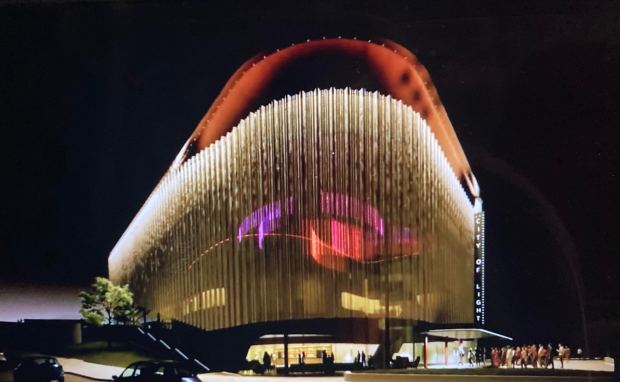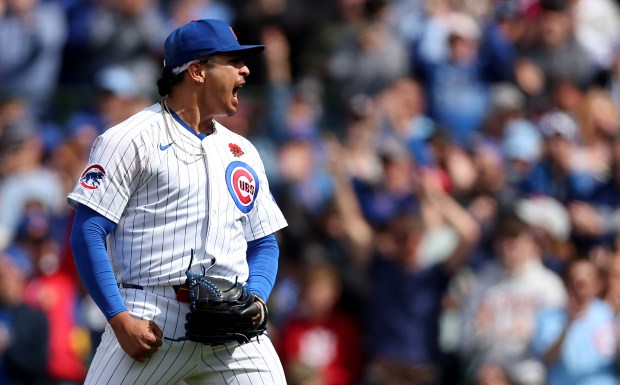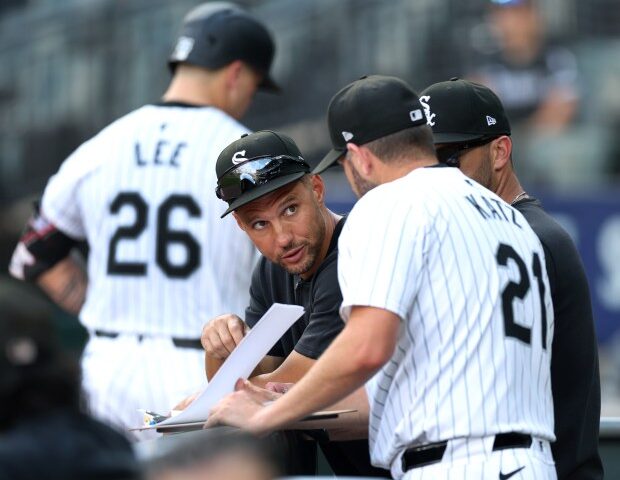Aurora Mayor-elect John Laesch told The Beacon-News in a recent interview that he has no intention of pursuing the City of Lights Center project.
Unofficial results from the consolidated election on Tuesday show Laesch winning the mayoral race over incumbent Richard Irvin, who conceded to Laesch that night. Laesch and the winners of the Aurora City Council races on Tuesday will be sworn-in to office on May 13.
On election night and in an interview with The Beacon-News on Thursday, Laesch laid out plans for his incoming administration, including the future of projects such as the City of Lights Center, changes at City Hall and more.
The 4,000-seat theater and 600-person event space called the City of Lights Center proposed for downtown Aurora, which Laesch previously spoke out against and said Thursday as a project is “pretty much dead” under his incoming administration, would have cost the city between $100 million and $120 million, according to past reporting.
“Nobody’s made a compelling argument to me,” he said. “I haven’t seen any concrete plans that say this is going to be a success.”
Aurora Civic Center Authority President and CEO Tim Rater previously said the City of Lights Center would help the agency make as much as it spends, something it used to do before the COVID-19 pandemic, which was backed by data compiled by CH Johnson Consulting, a Chicago-based real estate consulting firm.
According to Laesch, the village of Rosemont is selling its similar-sized concert venue, and if they cannot keep it full with Chicago nearby, he said it seems unlikely that people would drive into Aurora’s downtown for the City of Lights Center.
The city is more likely to succeed in bringing big concerts to RiverEdge Park, which is currently being expanded, especially since it is just across the street from the city’s Metra station, Laesch said. Aurora Chief Management Officer Alex Alexandrou previously said that the City of Lights Center would have been able to support acts that the Paramount and RiverEdge Park could not.
Although Laesch is not in favor of continuing the City of Lights Center project, he does still plan to support RiverEdge Park, Paramount Theatre and other entertainment that brings people into downtown Aurora to support businesses in the area, he said.
Laesch also said in a Facebook post to his campaign page before the Tuesday consolidated election that he plans to “invest in local entertainment and sustainable cultural programs,” plus make sure “the arts remain accessible to everyone.”
Also in that post, he shared plans to create a multi-use art space and “support initiatives that make Aurora a hub for the arts and innovation.”
He would also work to make sure the riverfront is there for the community instead of developers, encourage inclusive downtown events that “reflect our diverse community” and support local businesses over corporations, among other things, the post said.
Laesch was one of outgoing Mayor Irvin’s fiercest critics. For the past several years, including when he first ran for mayor against Irvin in 2021 and in his time on the Aurora City Council since 2023, he has been a vocal opponent of many projects and programs put forward by the Irvin administration.
On election night Tuesday, Laesch told The Beacon-News that as mayor he is going to push “aggressively” toward what he’s been talking about during this campaign: “a government and economy that works for everybody.”
Laesch told The Beacon-News Thursday that some of the Irvin administration’s projects he opposed will stop “cold in their tracks,” including a discussed apartment building in downtown Aurora on the Fox River’s west bank and at least one tax increment financing district, also called a TIF, proposed to support a redevelopment project downtown.
However, some projects he opposed will continue because they are too far along, he said, such as the $360 million Hollywood Casino resort being built near the Chicago Premium Outlets mall to replace the downtown casino.
The city’s economic development efforts were at the forefront of both candidates’ campaigns during this year’s mayoral race: Irvin highlighted the city’s successes under his administration, and Laesch accused Irvin of prioritizing his political donors and developers over other Aurora residents.
When asked about his plans for the Aurora Mayor’s Office of Economic Development, which has proposed to the Aurora City Council development incentives that he opposed, Laesch said any future economic development efforts would have some sort of sustainability focus. Plus, on Facebook, Laesch has said he will stop or severely reduce the use of TIFs.
“I have a probably more creative approach that will be rolled out with more substance at a future time,” he told The Beacon-News.
One thing Laesch said he would like to do, either through the economic development office or a partner organization, is to create a program to give matching grants to small businesses who are out of compliance with city code to help them get back into compliance.
He also plans to offer other incentives centered around green building and will start to build relationships at the state level to get funding for those things, he said.
However Laesch ends up changing the city’s economic development efforts, it probably won’t include giving more funds to the new Aurora Area Economic Alliance, which was formed by merging Aurora Downtown, the Aurora Regional Chamber of Commerce, Invest Aurora and the Quad County African American Chamber of Commerce. Laesch said he “doesn’t understand” giving millions to the Alliance to do economic development activities with no City Council oversight when a city economic development office could do those activities instead.
Although a post to Laesch’s campaign Facebook page ahead of the election said he heard some senior members of the Irvin administration planned to resign if he was elected, Mayor’s Office of Economic Development Executive Director David Dibo said he has no plans to resign and that he always works on behalf of taxpayers.
In that same Facebook post, Laesch said that despite rumors he was not planning to fire city employees en masse, which he again confirmed to The Beacon-News in an interview on Thursday.
However, he did say he already has a “good idea of where there’s underperformance,” “political appointments” or “ghost jobs.”
“I don’t know all of it, but eventually I will,” he said.
Laesch said his administration will have different goals than Irvin’s outgoing administration, so there may be some restructuring, and he will be hiring people “capable of carrying out my goals without causing too much disruption.”
He also plans to be hands-on as a full-time mayor, so he probably won’t need as much upper management, he said.
But, he needs to first make “an honest assessment,” and there’s “not going to be any political terminations,” only those made if a tweak like shifting departments cannot be made, according to Laesch.
Although Laesch’s detractors have made him out to be in favor of defunding the police, he said that is never something he has planned to do. When he on the City Council voted against police-related contracts, it was because he believed they were connected to Irvin’s campaign donors, he said.
In fact, he said the city’s 911 call center needs more staff.
Laesch said his plan is to make data-driven decisions to make sure the city is meeting people’s needs. According to a Facebook post from before the election, he also plans to pursue more state and federal grants, reduce city spending, push for a census recount to recoup lost revenue and use economic development gains to reduce property taxes.
He told The Beacon-News on election night Tuesday that his number one goal as mayor will be to respond to Aurora residents, including prioritizing things like complaints about the HelloFresh facility in town and a sound wall on Orchard Road.
Laesch soon plans to do a city-wide tour to introduce himself to the city’s different communities and share his vision for the future of Aurora, he said on election night, but also to listen to residents’ concerns so the city can be more responsive.
When asked Thursday who he plans to appoint to replace him in one of two alderman at-large seats on the Aurora City Council, Laesch said he may use the opportunity as a chance to experiment with sharing more power with the City Council.
That might mean bringing three names forward to the council to consider and vote on using a point-based system, he said. He also plans to ask aldermen during one-on-one meetings to see if they have any suggestions.
“For a long time, Aurora’s strong form of government has caused a rift with the council at times, and sometimes they don’t fight it or it’s normalized,” Laesch said. “I want to try and make a more democratic process.”
On election night, Laesch told The Beacon-News that he has “a lot of work to do” to repair relationships with some aldermen.
rsmith@chicagotribune.com





